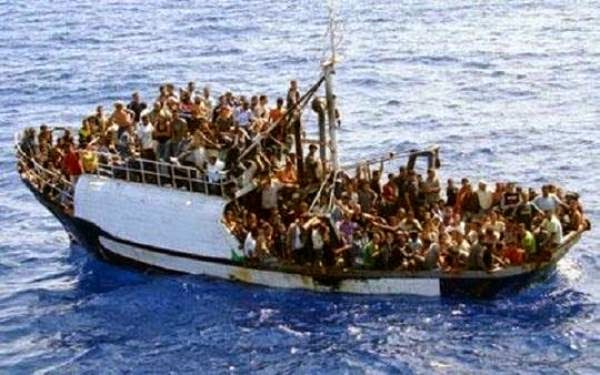So stopping people drowning in the Mediterranean is not a quick fix. Population movement out from the tropics is inevitable and will continue, and it will continue to be resisted - as we see with the Zulus in South Africa as much as with UKIP in England.
There are a range of responses we can make. We can kettle people up in Africa and let them cope as best they can, occasionally holding concerts to send some meagre 'aid' over like Lady Bountiful. We can make positive efforts to ameliorate economic conditions in Africa, and to build peace in the Middle East in the hope of slowing the movement. We can work to welcome and integrate migrants into economies across the temperate zone - which, from our point of view, means Scotland, because Scotland is where we are.
But what we can't do, it seems to me, is what the UK government is currently doing: turn our backs, withdraw the search and rescue boats, and let them drown.
So what can we, as ordinary citizens, do about this?
We can send a boat, well equipped, to help. It isn't impossible - folk in Northern Germany have already done it. One boat isn't going to stop the drownings, of course. It would be mainly a symbolic gesture - a gesture by the people of Scotland to shame the politicians of Westminster. And stopping the drownings will not stem the pressure of migrants seeking a better life; if anything, it will, as the cynical Tories calculate, encourage more to migrate. Migration is a bigger problem which we will have to address.
But in the meantime, we can - we practically can - do something to stop the drownings.
A good second hand 24 foot RIB, like the lifeboats use, costs about £30,000. Getting it kitted up and driven to the south of Italy, not more than another £10,000. The boat can cross to Lampedusa or Malta or wherever else it's needed under its own power. Rotating a crew change - crew of four - out to the south of Italy, not more than a £1,000. I'm guessing we could blag accommodation cheap for a project like this, but if we couldn't, people can live in tents in the Mediterranean in summer.
We'd also need fuel, food, large quantities of first aid supplies, and a whole lot of other consumables - say £10,000 worth a month.
So I think you could run this project for the summer - including buying the boat - for £100,000, and that's a practical crowd-fundable amount. I'm confident we could raise it.
The limitation, it seems to me, is crew. They'd need to have good boat-handling and navigation skills and also, ideally, paramedic skills. Some media skills and Italian language skills wouldn't hurt. People who've been through RNLI training would be ideal; some ex Marines and ex Navy people would have appropriate skills. And, of course, quite a few 'ordinary people' - medical people who also happen to be yacht folk; inshore fishermen who know first aid. Adventure training people.
We'd need to have at least four crew on station at any one time, ideally six; and either we would need to raise enough (extra) money to give those people a decent wage for the season, or else we'd have to have four crews (of at least four people each) who would each do about forty days on station, to have some handover time with the crew before them and the crew after them.
So the crew is either sixteen to twenty-four highly skilled volunteers, or it's a matter of raising at least another £150,000, which begins to look ambitious.
Of course, we'd need to check first that the Maltese or Italian or Greek coastguards would welcome the help, and we'd need to organise to work pretty much as they directed us. Of course, one boat, even well equipped and with a skilled crew, isn't going to solve the problem by itself - the objective is at least as much to shame the government into taking action as it is to directly rescue folk. And finally, of course there are risks - one has to assume that many of the people traffickers may be armed.
I cannot do this by myself. Realistically, I'm not reliable enough and I don't have the energy. For it to happen at all, I need to get a group of people together with energy to make it happen.
Will you join me?
